All photos courtesy of Philip and David Soanes unless otherwise stated.
A gift for melody and a charming penchant for live impromptu jams in legendary Kraków watering dens, founding member Phil Soanes reminisces on the collaborative songwriting project The Sunday Sessions, still fondly remembered by anyone lucky enough to have caught them in their element – live – in 2009 and 2010.
It was a Sunday morning in the winter of 2009. I was living in Krakow as an English teacher who liked playing music, but besides the odd jam with friends and my own solo recordings, I wasn’t doing very much. I had great music aspirations, but on that particular morning, all my attention was focused on making breakfast. My head was groggy from too many beers the night before, but I remembered Dave Devine, a fellow English teacher from Scotland and Laura Kapp, a student from Germany, were coming around to record a song of hers, so there was a pressing need to make myself presentable before they came. Marek Wilk, a local Pole, was in another room as he’d asked to sleep over. I had also invited Gordon Parris, a university student from South Africa, to come by with his guitar.
In the end, Laura’s song, something about a girl with ‘saucer eyes’ from what I remember, was never properly recorded, but The Sunday Sessions was spontaneously formed after a very successful jam which culminated in the creation of a song. Way Back In would later become the title of The Sunday Sessions’ debut album and this unexpected song gave us the sense that there was some sort of musical chemistry between us. It’s a song about living abroad, which was true for all of us except Marek. ‘You went somewhere to find your way back again’ the chorus line hummed, something a foreigner who was living in another country could relate to. With guitars, vocals and percussion, we decided to call ourselves a folk group even though more ‘folkier’ instruments would come later.
The whole ethos of The Sunday Sessions was based on the grassroots spirit of the Open Mic with the idea that ‘songwriting doesn’t have to be a lonely process’. We wanted a band with no fixed members where anyone who wanted to join, could.
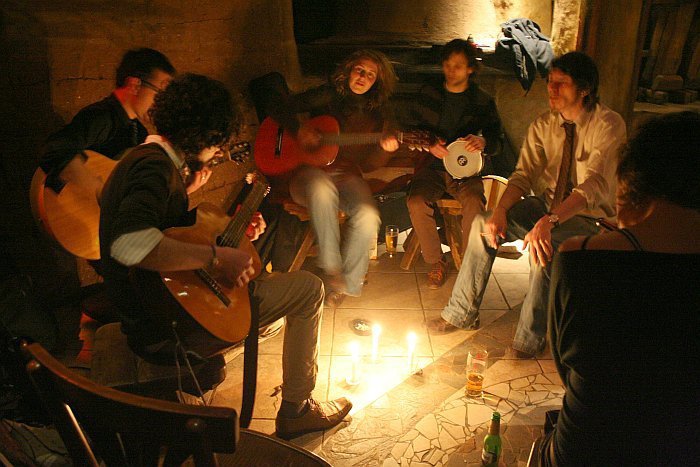
It all began at the Open Mic where I’d first met Marek and later Laura. This event played such a big role in the formation of The Sunday Sessions. Scotia Gilroy, an accordionist who was later to found the successful folk group Vladmirska, was the host of this monthly showcase which took place on the first Sunday of the month in the cosy confines of Cafe Szafe. It was here that I performed alone for the first time, just me, my guitar and shaky voice. I first met Marek there also after being fascinated by his rhythm playing and the fact that he was so courageous to get on stage and sing without any instrument. His talent at that point was raw and unrefined, but that’s what was appealing. It was also at the Open Mic that I encountered Laura. I remember feeling both honoured and terrified when she unexpectedly asked me to accompany her on a song of hers called Maybe. ‘It’s just four chords’ she said. That didn’t fill me with such confidence but I agreed to play those chords and let her wonderful vocals do the rest. Coming off stage I remember thinking to myself that I’d love to do that again. Little did I know what lay in store.
It’s a song about living abroad, which was true for all of us except Marek. ‘You went somewhere to find your way back again’ the chorus line hummed, something a foreigner who was living in another country could relate to.
— Phil Soanes
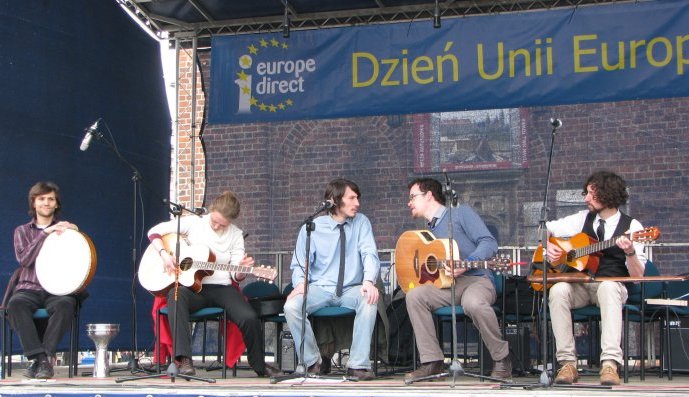
The whole ethos of The Sunday Sessions was based on the grassroots spirit of the Open Mic with the idea that ‘songwriting doesn’t have to be a lonely process’. We wanted a band with no fixed members where anyone who wanted to join, could. After witnessing Theresia Klumpp’s wild violin performance at one Open Mic, we immediately decided to invite her along for a jam. Luiza Szafranská, who played the flute, was another person who was asked to join one of our sessions as this instrument seemed perfect for our folk group. Unfortunately Luiza had other commitments and we only had a few jams together but Theresia became an integral part of the band as the open idea gradually became a closed idea when the songs started coming; what had started out as a bit of fun quickly became more serious. ‘I need you as the means to pull through’, a line from Wake Me Up a song of yearning for something to satisfy the need that I felt to find a place to feel grounded in. ‘That’s Unconditional Love’ sang Dave in a song called Unconditional which came from the soul and definitely raised the bar of our songwriting. When performed, it even made people cry as it was such a touching and beautiful piece of music. Another moving song was What Other People Do, a song I personally found hard to play due to the deep the emotions connected to the song after a hard break up – ‘If I had the chances, I’d be a romantic but somehow you never liked that stance’.
There was fun in the songs as well such as with the joyful Good Goodbye where Laura and Dave playfully duetted ‘I recall your eyes I recall a sniff that doesn’t fool me much at all Oh I’ll get you back – Don’t you worry baby I’ll get you back here in the end’. We even had a song about a table – Stół – which was inspired literally by a table in one of my favorite Kraków bars, Eszeweria. It was there and also in Mleczarnia, another iconic Kazimierz bar, that we often had impromptu jam sessions where everyone present was invited to play or listen. We played wherever we were allowed to. It was a means to share our music publicly and simply because we got so much satisfaction from playing together. Our wild ways were not always tolerated and sometimes we were told to pack our instruments away. One thing remained true: when we could play, we did, and it was wonderful when friends would come by and join in. Another way to share our music was to choose clothes pegs which we customised as business cards in order to pass out to people with the aim of encouraging them to like us on Facebook.
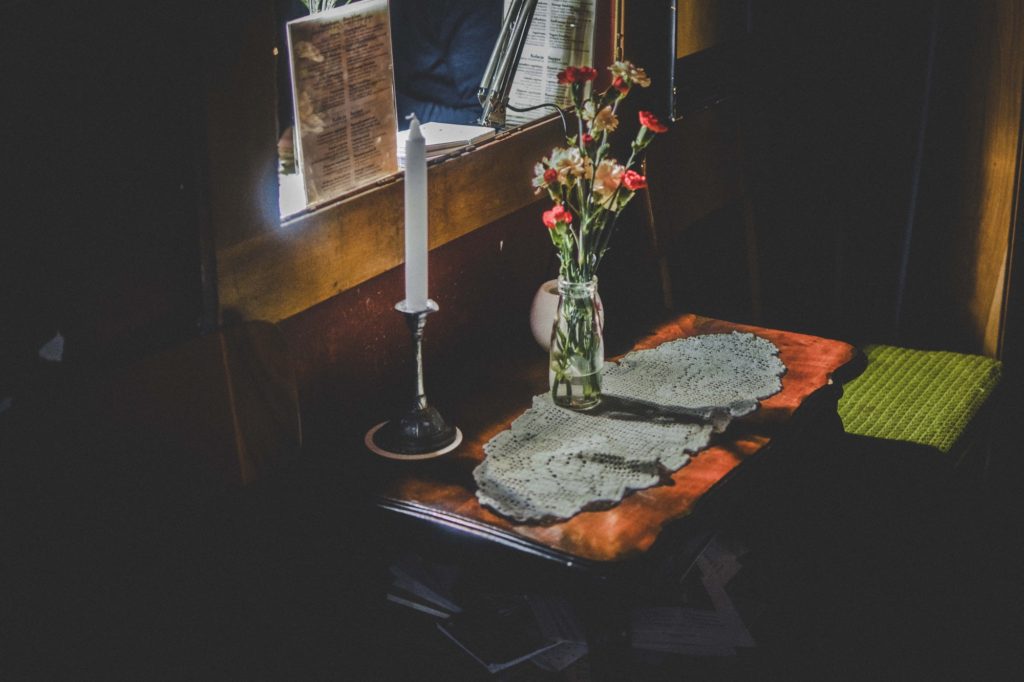
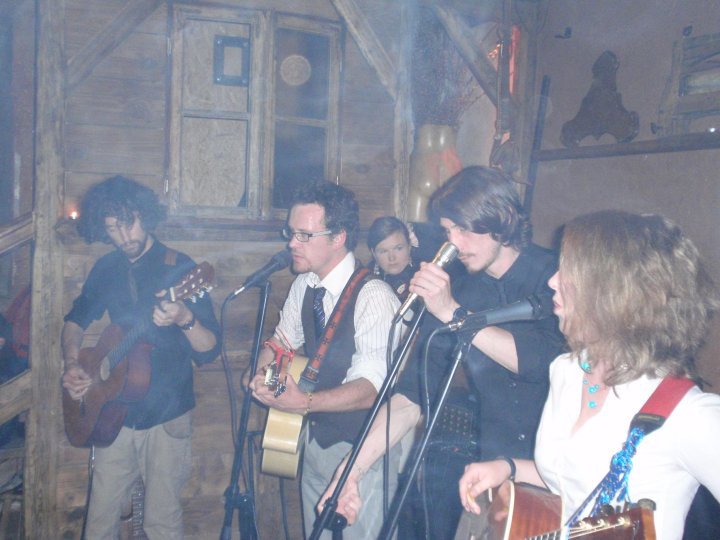
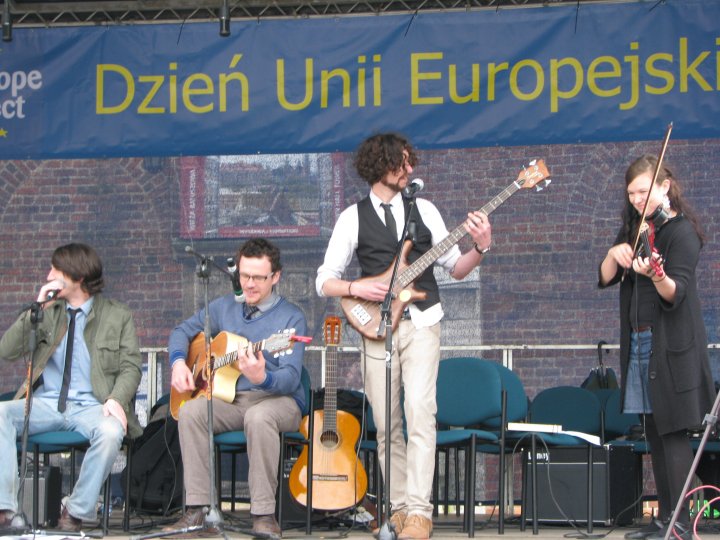
Our first gig was in the cavernous ‘Chata’ on Pędzichów Street. Chata later became a very important place for us as the owner, Jarek, was happy for our rehearsals to take place there. It gave us a chance to play louder as playing in other people’s homes started to become a bit of a noise hazard. Anyway, that show was amazing and by that I mean musically we were probably not prepared at all, we still needed to count out loud to hold the songs together, but the joy that we seemed to give the audience and ourselves made up for our inadequacies. Concert number two was in the centre of Kraków, in the famous Market Square (Rynek Główny). How was that possible? It seemed like a dream to play in the centre of the city after playing our first ever gig in a small cave-like bar, but the opportunity arose to play there and we grabbed it. It was such a memorable experience to play in the heart of the historic city centre and hear our music amplified across the whole square. Unfortunately the still necessary count-ins were also audible but we didn’t care. After all, it was only our second ever concert!
Another unforgettable occasion and perhaps one of our most professional concerts was at the cultural house just off the Market Square (Śródmiejski Dom Kultury). By then we had decided it was good to dress up for concerts which means dresses and skirts for the ladies and shirts and ties for the men. Having our ‘uniforms’ on added something to the performance and made us really feel as if we were taking our concerts seriously. Having the previously mentioned pegs clipped to our clothes was probably weird for other people but this was our image and I believe it was something original. With everything well prepared, coupled with the fact that all the members of the group looked great, I personally felt that this concert was a kind of artistic peak for us. The sound was excellent, the audience appreciative and now we had enough songs to perform alone without the need for a support act.
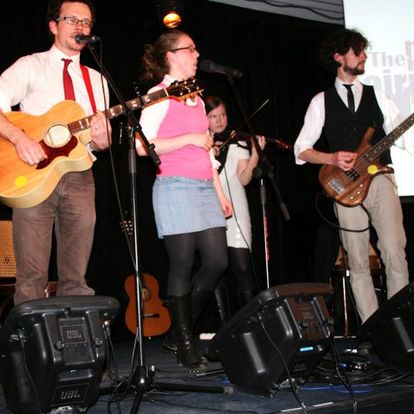
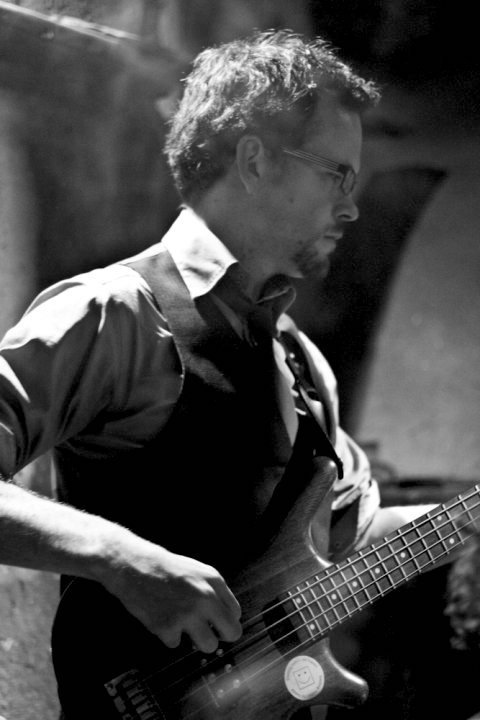
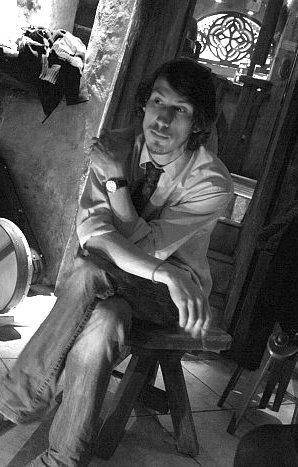
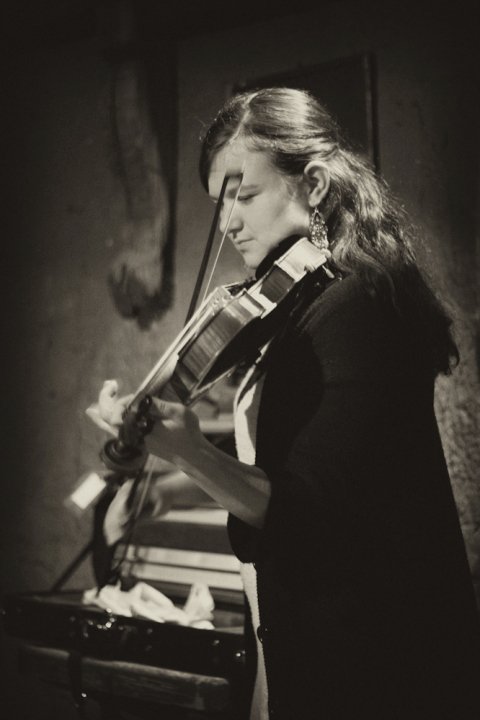
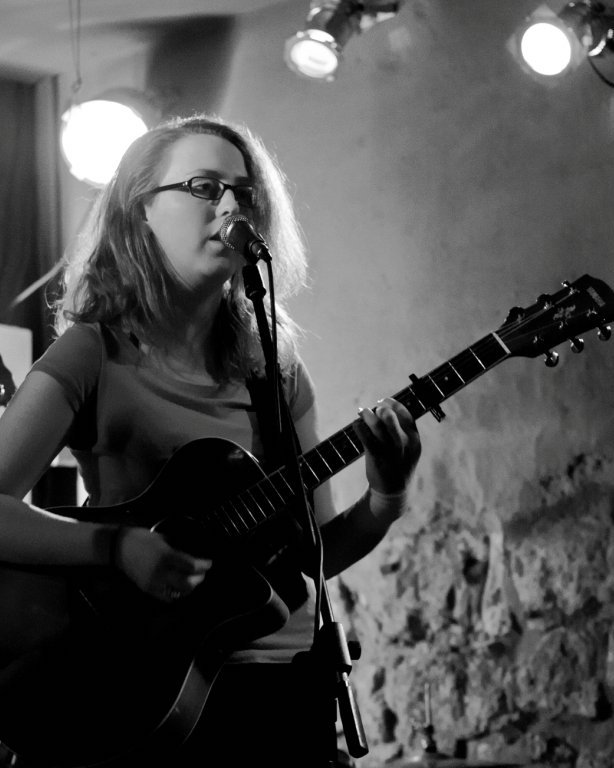
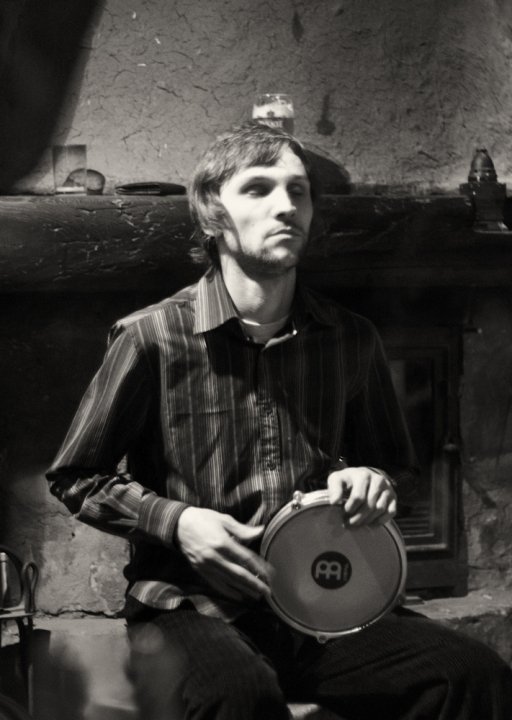
Not long after that, we realised that we had to try to get these songs recorded in order to capture what we had before it disappeared into the black hole of the musical universe. Laura asked her brother, Robert, to come to Krakow to record and in two stressful and hot summer days at Marek’s flat, we recorded 8 tracks for the album Way Back In which was eventually released on December 22nd 2010. The Sunday Sessions’ project came to a halt due to the summer break and the departure of Laura and Dave from Krakow, subsequently it was a struggle to get the album finished. Only myself, Gordon, Marek and Theresia remained in the city where it had all started and communicating online was not so easy. In my experience momentum is key to the progress of any music project I’ve been in; pushing for the next song, next gig, next album is key to the motivation of a group. The break had been expected as we knew the people in the group had other plans but getting the album out there was like the final chapter of our short but intense story – and a fitting ending.
Personally I was left with the feeling that we could have written more songs and recorded more. That said, in the short time we had, we achieved a lot and it was possibly the most creative project I’ve ever been involved in and one which gave the most fun because of the wonderful and unique chemistry that existed between us. What remains from this time is the album, the home recordings from our Sunday sessions (which we always recorded) and the poignant memories of playing live together. After the album was released, The Sunday Sessions tried to keep going without some of the original members, but it just didn’t work. Sometimes it’s just best to enjoy the memories of what was, let go and leave it with a ‘good goodbye’.
Personally I was left with the feeling that we could have written more songs and recorded more. That said, in the short time we had, we achieved a lot and it was possibly the most creative project I’ve ever been involved in and one which gave the most fun because of the wonderful and unique chemistry that existed between us.
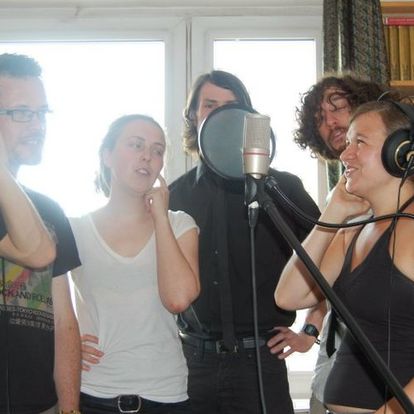
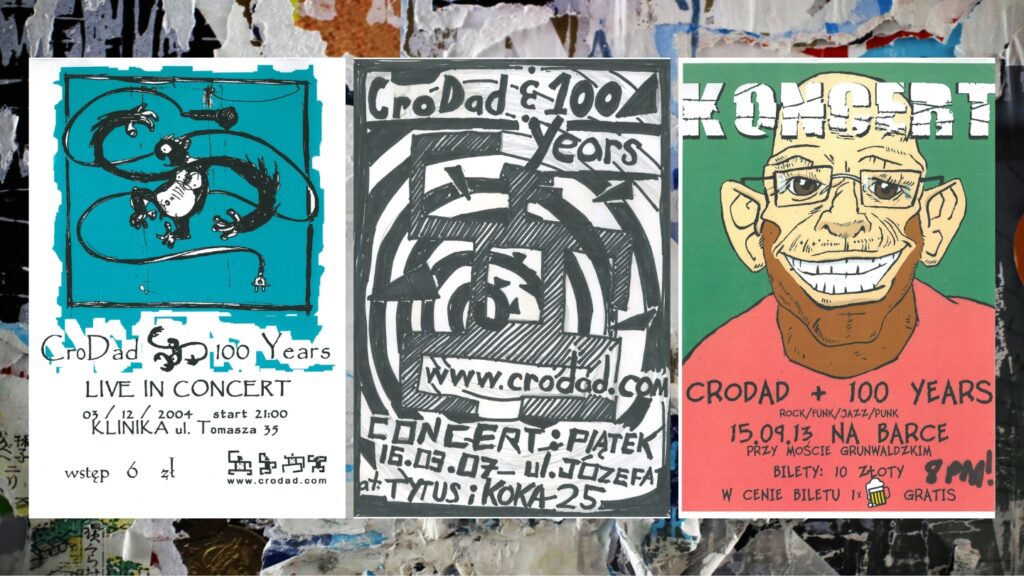
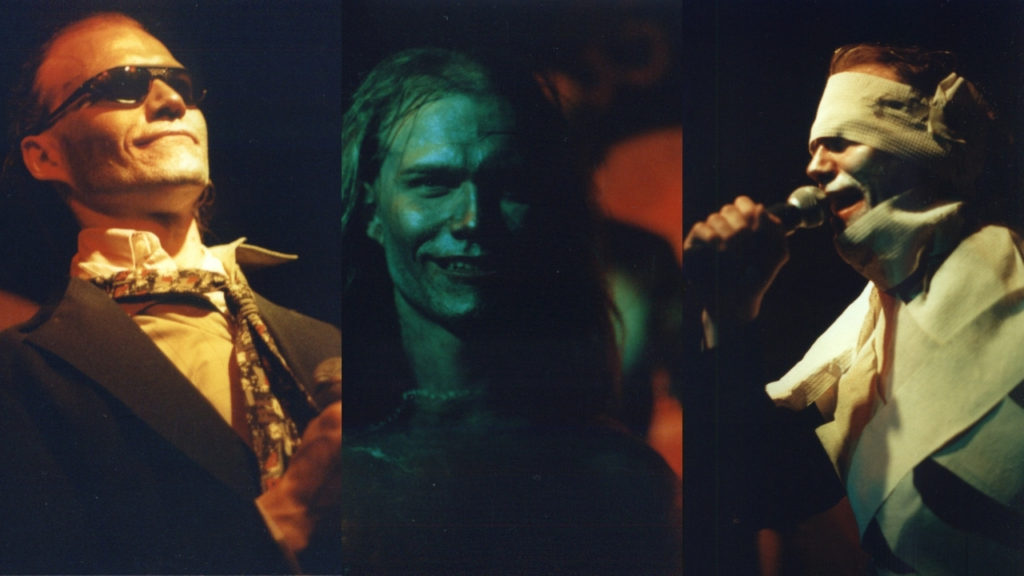
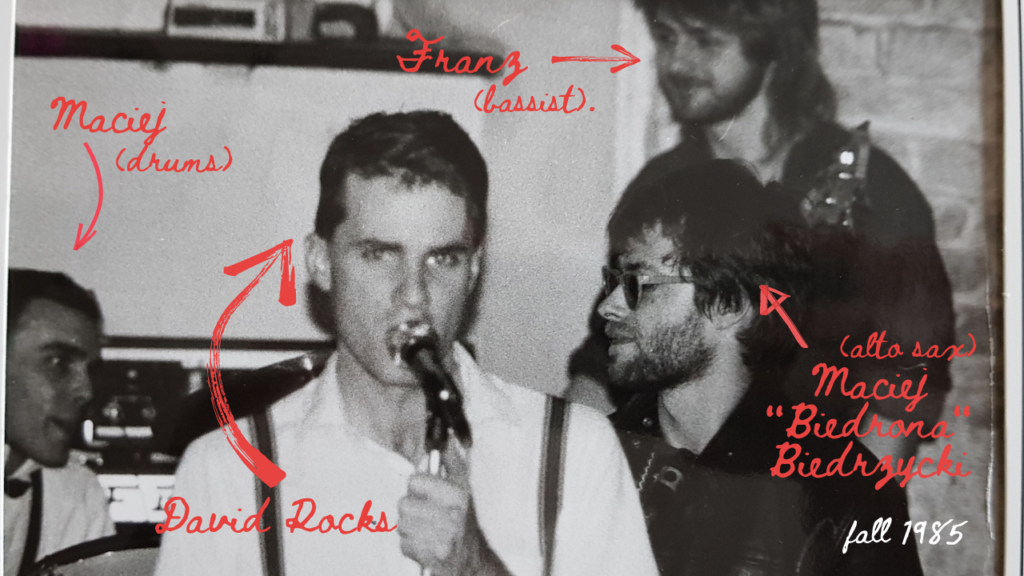

Comments
Thanks for that. I remember the Sunday Sessions and I have the CD. I never, however, attended any live shows, but I was well aware of the existence of the project during the time and I have had the pleasure of meeting the majority of the members. I do remember that there was a jam off an Awarians tune at Chata in which Theresa played violin and Igor played guitar. I suppose Igor was never in the project, but playing that jam with Theresa was the closest I remember getting to making music with the Sunday Sessions. Of course The Awarians and Boys on Bicycles played a gig at Kawiarnia Naukowa together, so there was a kind of collaboration between some of the members of the band and I. I met Marek at the first performance of my acoustic band "Shot Put Babcia" at Massolit Books. He seemed to enjoy our show very much and we talked at great length about Cat Stevens afterwards. The members of "Shot Put Babcia" included myself, Ryan Denton (of the legendary Fox Gang), Clint Anderson, Andy Baily, and Nathan Arnold (from the Beertones) not listed in any particular order and all of equal importance. I only remember about four performances that we did including one at ŁUBU-DUBU. The good ole' days.